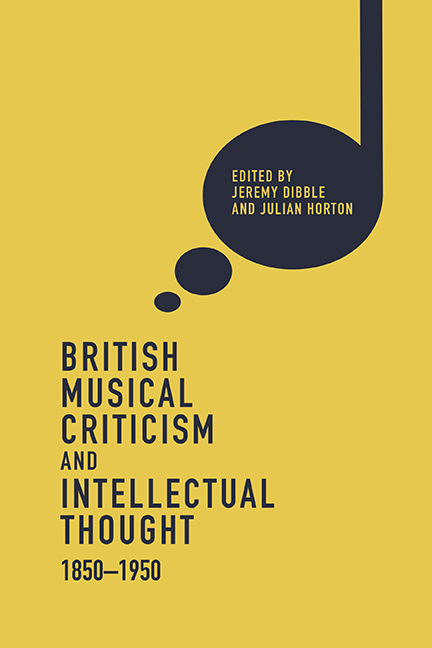Book contents
- Frontmatter
- Dedication
- Contents
- List of Illustrations
- List of Contributors
- Acknowledgements
- Introduction: Trends in British Musical Thought, 1850–1950
- 1 Avoiding ‘Coarse Invective’ and ‘Unseemly Vehemence’: English Music Criticism, 1850–1870
- 2 Spencer, Sympathy and the Oxford School of Music Criticism
- 3 Free Thought and the Musician: Ernest Walker, the ‘English Hanslick’
- 4 Ernest Newman and the Promise of Method in Biography, Criticism and History
- 5 ‘Making Symphony Articulate’: Bernard Shaw's Sense of Music History
- 6 Analysis and Value Judgement: Schumann, Bruckner and Tovey's Essays in Musical Analysis
- 7 The Scholar as Critic: Edward J. Dent
- 8 Russia and Eastern Europe
- 9 Anti-Intellectualism and the Rhetoric of ‘National Character’ in Music: The Vulgarity of Over-Refinement
- 10 Chosen Causes: Writings on Music by Bernard van Dieren, Peter Warlock and Cecil Gray
- 11 ‘Es klang so alt und war doch so neu’: Vaughan Williams, Aesthetics and History
- 12 Constant Lambert: A Critic for Today? A Commentary on Music Ho!
- 13 The Challenge to Goodwill: Herbert Howells, Alban Berg and ‘The Modern Problem’
- 14 Hans Keller: The Making of an ‘Anti-Critic’
- Select Bibliography
- Index
- Titles listed here were originally published
4 - Ernest Newman and the Promise of Method in Biography, Criticism and History
Published online by Cambridge University Press: 17 July 2019
- Frontmatter
- Dedication
- Contents
- List of Illustrations
- List of Contributors
- Acknowledgements
- Introduction: Trends in British Musical Thought, 1850–1950
- 1 Avoiding ‘Coarse Invective’ and ‘Unseemly Vehemence’: English Music Criticism, 1850–1870
- 2 Spencer, Sympathy and the Oxford School of Music Criticism
- 3 Free Thought and the Musician: Ernest Walker, the ‘English Hanslick’
- 4 Ernest Newman and the Promise of Method in Biography, Criticism and History
- 5 ‘Making Symphony Articulate’: Bernard Shaw's Sense of Music History
- 6 Analysis and Value Judgement: Schumann, Bruckner and Tovey's Essays in Musical Analysis
- 7 The Scholar as Critic: Edward J. Dent
- 8 Russia and Eastern Europe
- 9 Anti-Intellectualism and the Rhetoric of ‘National Character’ in Music: The Vulgarity of Over-Refinement
- 10 Chosen Causes: Writings on Music by Bernard van Dieren, Peter Warlock and Cecil Gray
- 11 ‘Es klang so alt und war doch so neu’: Vaughan Williams, Aesthetics and History
- 12 Constant Lambert: A Critic for Today? A Commentary on Music Ho!
- 13 The Challenge to Goodwill: Herbert Howells, Alban Berg and ‘The Modern Problem’
- 14 Hans Keller: The Making of an ‘Anti-Critic’
- Select Bibliography
- Index
- Titles listed here were originally published
Summary
ERNEST Newman (1868–1959) had an extremely long career not only as a music critic but also as a biographer and historian. His first major article appeared in 1889; his last was published seventy years later, in 1959. His greatest achievements were his thirty-nine years as chief music critic for The Sunday Times (1920–58), in which he wrote some 1,800 articles, and his magisterial book The Life of Richard Wagner, published in four volumes between 1934 and 1956. In books, articles, programme notes and translations, Newman wrote on a huge variety of topics ranging from early music to late Schoenberg. He had particular interests in opera and vocal music and music by Edward Elgar, Richard Strauss, Hugo Wolf, Beethoven and Berlioz, and wrote extensively on all of them. He cared little for the music of Liszt, Mozart or anything French. He loved music-hall repertory but loathed jazz and atonal music. He was highly regarded as a fluent, sarcastic and humorous writer, though his pomposity and occasional arrogance were less appreciated.
There is a constant thread running through Newman's works (whether biographical, critical or historical): the need for method. In dozens of publications he argued that method would ensure objectivity and therefore authority, and that it required both theoretical and practical application. Newman's desire for method came from three sources. First, the domination of positivism in British and European thought, particularly in the second half of the nineteenth century, which sought to create taxonomies into which generalist as well as specialist knowledge could be shoe-horned. Comte's positivism, for example, provided such a taxonomy, while a schema for music research was proposed by Guido Adler. Other specialist schemes included Emile Hennequin's theory of esthospsychology and Richard Wallaschek's mapping of a positive musicology in such works as Asthetik der Tonkunst (1886). Second was Newman's association with a group of leftist intellectuals who dubbed themselves ‘academic freethinkers’ and championed a new order of knowledge that was based on secular rather than religious grounds. Their intellectual heroes, in addition to Comte and Hennequin, included J. S. Mill, Herbert Spencer and Charles Darwin. Third was Newman's intense dissatisfaction with contemporary English musical criticism, biography and history. He thought much of what he read by his contemporaries was impressionistic or self-referential. In order to overcome this culture of dilettantism, reform was needed.
- Type
- Chapter
- Information
- Publisher: Boydell & BrewerPrint publication year: 2018

